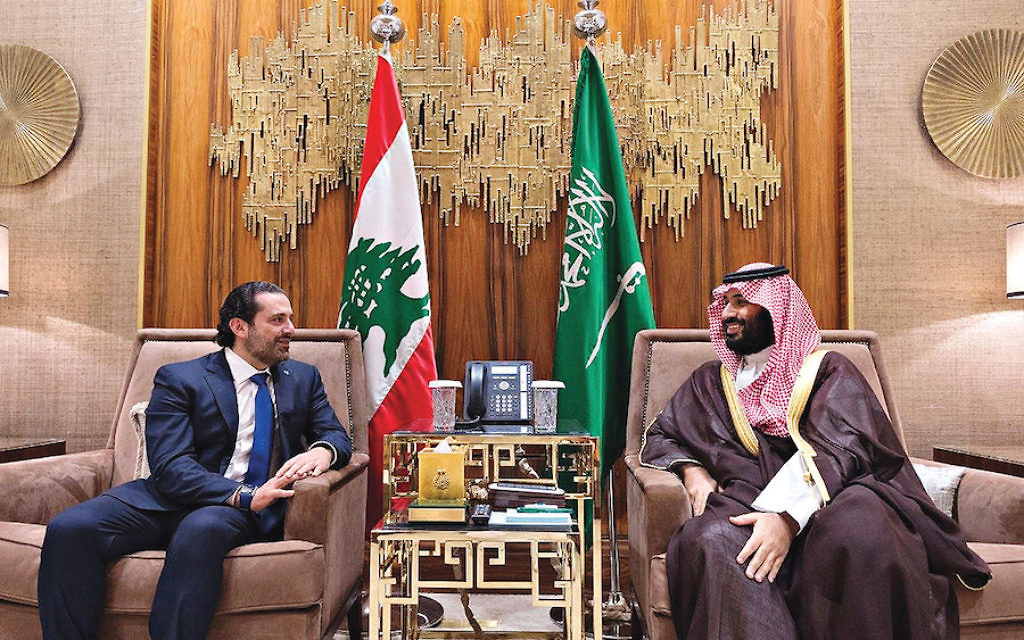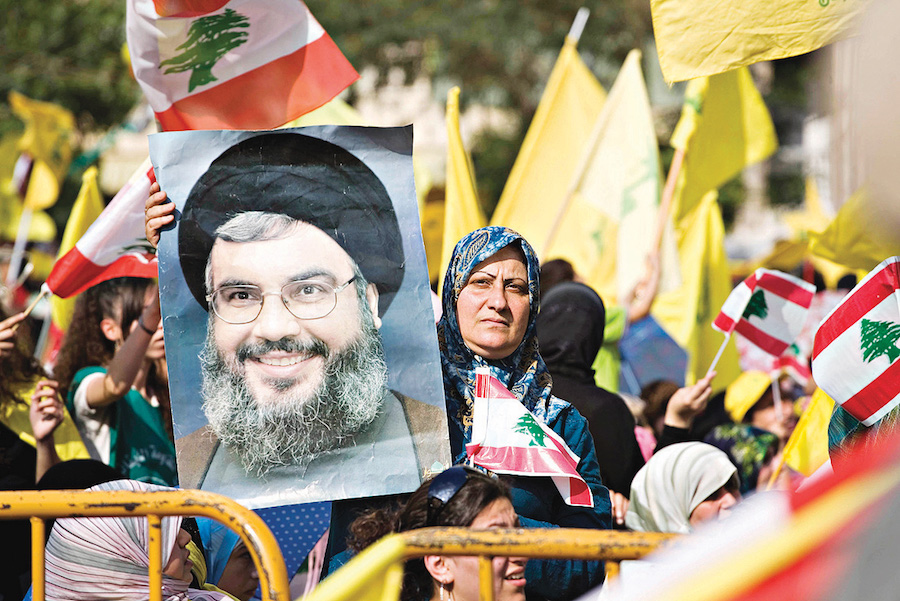Special Report: The Muddle East
Growing tension between the region’s two biggest rivals threatens a new war against an old enemy

Lebanon’s Prime Minister Saad Hariri was hosting a dinner earlier this month when a message came through on his phone. Guests say his demeanour “changed instantly”. He excused himself. Three hours later he was on a plane to Saudi Arabia. Next day he was on Saudi TV announcing his shock resignation.
In a speech thought to have been written by Riyadh, the Saudi capital, Hariri blamed the Saudis’ arch enemy, Iran, and Iran’s proxy militia in Lebanon, Hezbollah. It left Lebanon stunned, including Hariri’s allies. Lebanon’s president suggested Hariri was essentially a Saudi hostage. Adding an air of the dramatic, Hariri said his life was in danger, evoking memories of his billionaire father Rafik, whose 2005 assassination – blamed on Hezbollah – provoked a minor revolution. Last week the Saudis ordered their citizens out of Lebanon. Within hours, Gulf allies did likewise.
What is going on, and why is it relevant to Israel?
Get The Jewish News Daily Edition by email and never miss our top stories Free Sign Up
Think of it like plate tectonics. After 38 years of building pressure, two of the great regional land masses – Sunni superpower Saudi Arabia and Shia superpower Iran – are colliding, triggering earthquakes. The next will be in Lebanon.
Why now? The new, all-powerful 32-year-old Saudi Crown Prince Mohammed bin Salman, whose ageing father sits on the throne, is desperate for a win. In the game of chess that is the muddled Middle East, the Saudis have lost several valuable pieces in Syria, where they bet on the rebels. We know because in October, leaked documents showed that Saudi Arabia’s intelligence minister ordered Syrian rebels to attack Damascus and “flatten the airport” in 2013, providing 120 tons of explosives and weapons to do so.
They didn’t flatten it, and didn’t win. Instead, Iran sided with President Bashar al-Assad, Hezbollah and the Russians triumphed. Worse, the young heir, who took control in 2015, is losing pieces in Yemen, too, where Saudi bombing to reinstate a puppet regime seems increasingly in vain – after two years attacking Iran-backed Houthi rebels, who refuse to be beaten, the Saudis are bogged down. In Iraq, too, the Saudis have lost their foothold. The government there is Shia (i.e. more friendly toward Iran) and Shi’ite militias are more useful than the Iraqi army.

In short, what Jordan’s King Abdullah II has long warned of – the so-called Shia Crescent stretching from Iran to Lebanon – is now reality. The Saudis feel encircled, as does Israel, but all the noises are coming from Riyadh. When a ballistic missile was fired at the city’s airport from Yemen this month, Saudi Foreign Minister Abel Jabair called it “an act of war” by Iran. Likewise, Saudi’s Minister for Gulf Affairs Thamer al-Sabhan said last week that Lebanon’s government would “be dealt with as a government declaring war” because of Hezbollah’s “acts of aggression”.
In terms of sabre-rattling, it is deafening, but to what effect? Commentators say Iran has played a poor hand brilliantly, and is now able to flick the finger at Donald Trump continuing its missile development regardless of his tweets.
So why do the Saudis want to line up Lebanon as the next Sunni-Shia battleground? Everything suggests otherwise. Militarily, Hezbollah is the only game in town, far more powerful than the Lebanese army. Moreover, the Saudis would struggle to get there over unwelcoming Syrian airspace defended by advanced Russian missiles and an irritated President Assad. Even if they could, the Saudis are useless on the battlefield. Senior British diplomat Sir John Jenkins told a Jewish News-BICOM audience in Westminster this month the Saudis were “high capability, low competence,” whereas Iran could “control a battlefield, exercise command and control, plan logistics and sustain strategic intent over decades… That’s the bit that wins wars in the Middle East”.
Watch British diplomat Sir John Jenkins at the Jewish News-BICOM audience in Westminster:
That the Saudis are targeting Lebanon is not in doubt. Those listening closely have heard a subtle policy shift – whereas the Saudis always treated Hezbollah and Lebanon as different, now they’re treated as one. Likewise in Jerusalem, where Israeli Defence Minister Avigdor Lieberman said last month that the “Lebanese army has lost its independence and become an integral part of Hezbollah’s network”.
For two states who don’t officially talk, Israeli and Saudi statements now sound remarkably similar. The same language and sentiments can be heard in Hariri’s resignation speech. “Iran’s arm… has managed to impose a fait accompli on Lebanon through the power of its weapons,” he said. “They have built a state within a state.” They’re not just on the same page; they’re reading the same line.
For years, Israelis ‘in the know’ have pointed to a “convergence of interests” between Israel and the Gulf monarchies, hinting at behind-the-scenes coordination. Now may be when they act in concert. In Lebanon, Israel sees a host state for a hostile party, and the Saudis see the chance to bloody Iran’s nose with Hebrew fists.
How they combine is not yet clear but the Saudis have the money and Israel has the means, so one may help finance the other’s actions. Moreover, Israel’s Chief of Staff Lt. Gen. Gadi Eizenkot said just this week that Israel is “prepared to share information [with Saudi Arabia] if there is a need to do so”. The two may also plan a pincer movement, with the Saudis ordering the Syrian rebels they still control to attack Hezbollah from the east just as Israel attacks from the south. Hit from both sides at once, Hezbollah would struggle.
Does Israel have the appetite for another incursion into Lebanon? We’ve been there before, in 1978, 1982, 1993, 1995 and 2006, when 1.5 million people were displaced. Lebanon is not a place of happy memories for Israel, yet Hezbollah is not only still standing, it is battle-hardened from fighting in Syria, with a network of contacts and an arsenal of rockets.
Dug-in and dangerous, it can now be supplied via an open road from Tehran to Beirut, connecting a state that wants to wipe Israel from the map with a militia within range to do so.
Surely that’s a red line crossed for Israel, which now just needs a casus belli (cause of war), but Hezbollah leader Hassan Nasrallah thinks Israel won’t go in unless it can be assured of a “quick, decisive and inexpensive war,” which it can’t.
Where does all that leave us? Back with Saad Hariri, who flew back to a puzzled Lebanon this week after a puzzling stopover in France.
A pawn in an almighty game, the way he is manoeuvred over the coming weeks will be telling.

Thank you for helping to make Jewish News the leading source of news and opinion for the UK Jewish community. Today we're asking for your invaluable help to continue putting our community first in everything we do.
For as little as £5 a month you can help sustain the vital work we do in celebrating and standing up for Jewish life in Britain.
Jewish News holds our community together and keeps us connected. Like a synagogue, it’s where people turn to feel part of something bigger. It also proudly shows the rest of Britain the vibrancy and rich culture of modern Jewish life.
You can make a quick and easy one-off or monthly contribution of £5, £10, £20 or any other sum you’re comfortable with.
100% of your donation will help us continue celebrating our community, in all its dynamic diversity...
Engaging
Being a community platform means so much more than producing a newspaper and website. One of our proudest roles is media partnering with our invaluable charities to amplify the outstanding work they do to help us all.
Celebrating
There’s no shortage of oys in the world but Jewish News takes every opportunity to celebrate the joys too, through projects like Night of Heroes, 40 Under 40 and other compelling countdowns that make the community kvell with pride.
Pioneering
In the first collaboration between media outlets from different faiths, Jewish News worked with British Muslim TV and Church Times to produce a list of young activists leading the way on interfaith understanding.
Campaigning
Royal Mail issued a stamp honouring Holocaust hero Sir Nicholas Winton after a Jewish News campaign attracted more than 100,000 backers. Jewish Newsalso produces special editions of the paper highlighting pressing issues including mental health and Holocaust remembrance.
Easy access
In an age when news is readily accessible, Jewish News provides high-quality content free online and offline, removing any financial barriers to connecting people.
Voice of our community to wider society
The Jewish News team regularly appears on TV, radio and on the pages of the national press to comment on stories about the Jewish community. Easy access to the paper on the streets of London also means Jewish News provides an invaluable window into the community for the country at large.
We hope you agree all this is worth preserving.
- Features
- News Features
- Lebanon
- Lebanon’s Prime Minister Saad Hariri
- Lebanon’s Prime Minister
- 2017 Miss Lebanon Emigrant competition
- Saudi Arabia
- Saudi-Lebanon relations
- Saudi Arabia-Israel relations
- Riyadh
- Saudi Crown Prince Mohammed bin Salman
- iran
- Hezbollah
- Bashar Al Assad
- Syria
- Iraq
- Shia
- Sunni
- Jordan’s King Abdullah
- Thamer al-Sabhan
- Sir John Jenkins
- middle east
-
By Brigit Grant
-
By Laurent Vaughan - Senior Associate (Bishop & Sewell Solicitors)
-
By Laurent Vaughan - Senior Associate (Bishop & Sewell Solicitors)
-
By Laurent Vaughan - Senior Associate (Bishop & Sewell Solicitors)
-
By Laurent Vaughan - Senior Associate (Bishop & Sewell Solicitors)





















